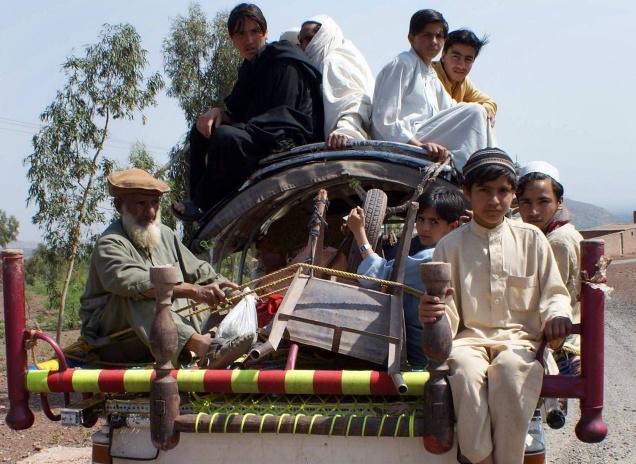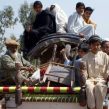
Pakistani Military Launching Counter-Insurgency Operation in Orakzai Agency
Publication: Terrorism Monitor Volume: 8 Issue: 13
By:

A new military offensive against the Pakistani Taliban in Orakzai Agency and Tirah Valley of the Khyber Agency appears to be in the works. It is not clear how big the forthcoming military operation will be, though it may not be of the scale witnessed recently in the Swat Valley and the South Waziristan Agency. It is more likely to be a more low profile military operation like the one carried out in the Bajaur Agency, where the security forces captured Damadola in February 2010. Damadola was the home base of Tehrik-i-Taliban Pakistan (TTP) commander Maulvi Faqir Mohammad and was considered the nerve center of the TTP. Frontier Corps Major-General Tariq Khan told reporters on March 3, “We are facing problems in Orakzai and Tirah and will launch operations there in the near future (Dawn, March 4).”
Orakzai Agency was the base of Taliban leader Hakimullah Mahsud, who is believed to have died in a drone attack earlier this year. The TTP insists he is alive, but doubts still linger about his death. He was reported to have died in Multan in southern Punjab while on his way to Karachi for medical treatment, but nobody has seen his corpse. Orakzai is the birthplace of the Pakistani Taliban, which formed in early 2000, when Pakistani Deobandi militants from Orakzai Agency used the term "Tehrik-i-Taliban" for the first time. The Pakistani Taliban announced themselves when the local Shi’a Muslim community started building a mosque near a Shi’a shrine in the village of Alikhel in Orakzai. The Pakistani and Afghan Taliban descended upon the villages of Alikhel, Tallyaya and Baropalay, demolished the mosque and banished the Shi’a community from the area. [1] According to one account, the newly founded Pakistani Taliban wanted to take over the lands owned by the local Shi’a to cultivate poppy to fund jihad in Pakistan. [2]
Military activity has increased in Orakzai recently, with scores of militants reported dead in the fighting and bombing by Pakistan Air Force jets. Several Orakzai commanders and militants of the group headed by Mullah Nur Jamal (a.k.a.Mullah Tufan) were also killed in neighboring Kurram Agency during a clash with a pro-military Taliban group led by Commander Rafique (Dawn, March 21). In the second week of March, local tribesmen reported that troops were taking positions in Lower Orakzai and had sealed off all main routes to and from Orakzai Agency. Pakistani Air Force (PAF) jets bombed six hideouts of the Taliban in Orakzai on March 14, killing 13 Taliban (Dawn, March 15). This was followed by further air raids on March 19-20, reportedly killing another 20 Taliban (Daily Times, March 20; Dawn, March 21). At the same time, troops captured the area of Kasha in Orakzai and directed sporadic artillery fire from the central Kurram and Ferozkhel area on militant positions in neighboring Khyber Agency to stop the movement of militants (Dawn, March 21). A pro-government lashkar (ad-hoc militia) killed several militants in Orakzai as the PAF pursued the fleeing militants, killing 25 Taliban (The News, March 21). On March 21, hotly pursuing the fleeing militants, PAF planes bombed them in Kurram Agency and killed 25 of them. Bombing killed nine militants in Orakzai on the same day (The News, March 22).
Major-General Tariq Khan’s announcement of coming military operations in Orakzai comes as a surprise to many Pakistan-watchers, as the Pakistani military had snubbed both the Americans and Prime Minister Yousuf Raza Gillani when they requested the start of such operations. Prime Minister Gillani appears to have been softly prodding the Pakistan Army for some time to take the military offensives that started in Swat and South Waziristan to their logical end by carrying out full-scale operations in Orakzai and North Waziristan. Prime Minister Gillani had announced as early as December 12, 2009 that the government had decided to launch a similar operation in Orakzai after the success of the South Waziristan operation (Dawn, December 4, 2009). However, the Pakistani military remained non-committal and reluctant to extend themselves further. In what was a clear snub to U.S. Secretary of Defense Robert Gates during his visit to Islamabad in January, Pakistan army spokesman Major-General Athar Abbas ruled out the possibility of launching any new operations beyond South Waziristan in the next 19 months (Dawn, 22 January).
According to a senior Pakistani official, the reasoning behind the decision to launch the operation in Orakzai was two-fold. First, the operation is being launched at a time just as the United States and Pakistan are set to start the next round of their strategic dialogue. The offensive is aimed at countering U.S. pressure on Pakistan to do more to fight terrorism on the frontier. Second, General Ashfaq Parvez Kayani, who is to retire in November, is seeking an extension to his tenure as the Chief of the Army Staff. In anticipation of an extension to his service, he has even granted an extension of service to several of his favorite generals without the consent of the prime minister. However, the Pakistani government is reluctant to oblige him. The government would find it hard to say “no” if the Americans intervene in General Kayani’s favor, something it might do if the Americans observe an acceleration of the war on terrorism. [3]
The Pakistani military has not announced the details of the new military offensive as it has done in the past. Whether the military operation expands or runs out of steam in the coming weeks depends on the outcome of the strategic dialogue, or possibly how forcefully the United States advocates in favor of extending General Kayani’s service before his civilian bosses.
Notes:
1. Based on the author’s research in Orakzai agency from March to July 2000.
2. Author’s interview with local Shi’a leader Syed Jamil Hussain, July 2000.
2. Author’s telephone interview with a senior Pakistani official, March 2010.




